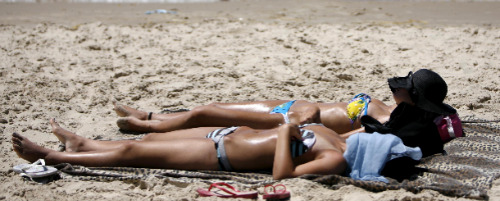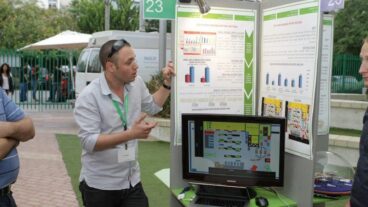
An Israeli researcher has shown that antioxidants and omega-3 fatty acids, like those in the diet eaten in Mediterranean regions where melanoma rates are extremely low, can help to protect us from skin cancer.
Most of us love to have a golden, appearance-enhancing tan. But we also know that to get that summer glow we have to expose ourselves to dangerous UV rays, which has long-term implications for our health.
In a study recently published in Nutrition Reviews, Dr. Niva Shapira of Tel Aviv University (TAU) suggests that we “go Greek” with foods such as olive oil, fish, yogurt and colorful fruits and vegetables to fight the oxidizing effect of the sun. She also recommends regular applications of sunscreen and appropriate body coverings such as hats, beach cover-ups, and other sportswear.
Put SPF on your plate
The sun’s rays damage both the skin and the immune system by penetrating the skin and causing photo-oxidation, Shapira explains. This affects both the cells themselves and the body’s ability to repair any damage.
Previous research demonstrated that the sun’s UV rays damage the skin by exciting its molecules and causing them to become oxidized, says Shapira, who says “My theory was that if you prepared the body with sufficient and relevant antioxidants, damage could be reduced.”
To test her theory, Shapira and Prof. Bodo Kuklinski of Rostock University in Germany organized two groups for a study at the Baltic Sea. One group was provided a drink high in antioxidants, while the other enjoyed beverages such as sodas. Those who hydrated with the antioxidant-rich drink had 50 percent fewer oxidation products in their blood at the end of the two-week period, which included five to six hours of exposure to the sun daily.
Further studies proved that these antioxidants, especially carotenoids (fruit and vegetable pigments like red from tomatoes and watermelons, and orange from carrots and pumpkins that accumulate in the skin where they serve as a first line of protection) had delayed the phenomenon of skin erythema, which indicates the initiation of tissue and DNA damage that can lead to skin cancer.
This information is invaluable, especially in light of climate change, notes Shapira. As temperature and humidity rise, which aggravates the damaging effect of solar UV rays, it is increasingly difficult for sunscreen alone to protect us effectively. So while covering up, slathering on the sunscreen, and avoiding the sun during peak hours are still important to prevent a burn, she recommends dietary changes as well, to promote skin health.
Eat the real thing
It might be tempting to load up on dietary supplements instead of changing your diet to adopt one like the Mediterranean Diet, said to have multiple benefits. But Shapira stresses that supplements are simply not as effective. Foods provide nutrient “synergy,” she says.
“In foods, many vitamins and various antioxidants and bioactive ingredients work to support one another and the body’s natural protective mechanisms. Synergies between the nutrients in your food, which make a significant contribution to health, may contrast with the relative isolation of a vitamin supplement,” she says.
The research is attracting attention: For the first time, the Israel Cancer Association has included the nutritional information as part of their ‘Smart in the Sun’ advisories.
It’s not necessary to move to Greece, Israel or Turkey to reap the benefits of the Mediterranean Diet. Most of the appropriate foods are stocked in American and European grocery stores. Olive oil, fresh fish, fruits and vegetables, red wine in moderation, whole grains, beans and lots of water should be at the top of the shopping list, Shapira advises.
And there are some foods to avoid, she points out. Go light on red meat, processed foods, and alcohol (red wine is preferable), and be wary of foods that contain the photosensitizing compound psoralen, such as parsley, celery, dill, cilantro and figs.












